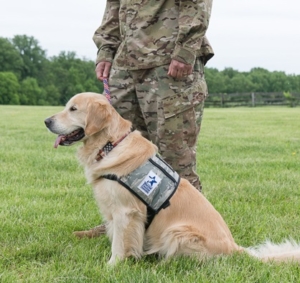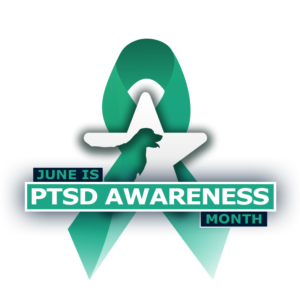PTSD Awareness Month: Recognizing and Supporting Our Veterans
 June is Post-Traumatic Stress Disorder (PTSD) Awareness Month. Here at Warrior Canine Connection, we’ve witnessed firsthand how the best therapy sometimes comes with four legs and a wet nose. For Veterans grappling with PTSD, canine-assisted therapy can be incredibly effective in recognizing triggers, reducing anxiety and enhancing social integration, among many other benefits.
June is Post-Traumatic Stress Disorder (PTSD) Awareness Month. Here at Warrior Canine Connection, we’ve witnessed firsthand how the best therapy sometimes comes with four legs and a wet nose. For Veterans grappling with PTSD, canine-assisted therapy can be incredibly effective in recognizing triggers, reducing anxiety and enhancing social integration, among many other benefits.
This month and every month, we at WCC are committed to fighting the stigma around PTSD and providing unwavering support to Service Members and Veterans who are battling this condition.
As one Veteran who participated in our Mission Based Trauma Recovery (MBTR) program shared, “Training the dogs gave me time away from my PTSD symptoms. I was more focused on connecting with the dogs than my own symptoms.”
Other MBTR participants also shared their experiences with the program.
“Before I began the 8-week program, I was suffering from major depression,” shared a Veteran participant.” After numerous treatments, including a variety of medications and ten sessions of ECT, I was only minimally better. I was feeling numb for years and was unable to feel any joy. I never left my home and did not want to do anything, even bathing was difficult. My occupational therapist recommended WCC. I honestly did not want to go, but I forced myself. After the first two sessions, I finally began to have some sort of feeling for the first time in years. I now leave my home several times a week and I want to do some things. It is a work in progress, and I have plenty of bad days, but this is a breakthrough.”
“Training the service dogs gave me a sense of purpose; connectedness with fellow veterans, instructors, and dogs; increased my mood; helped me be patient with my own dogs; and gave me a sense of pride that I could contribute to society,” shared an MBTR participant. “It made me feel like the VA cares about veterans with PTSD; I felt loved by the animals and instructors. Overall, this program made helped me feel good about myself again, purposeful and confident in myself.”
It’s important to recognize that training or having a service dog isn’t a quick solution for PTSD—it requires dedication, time and hard work. It’s just one of many effective treatments supported by the medical community to support Veterans battling PTSD.
The key is to know that help is available, find the options that works best for you, and to know that you are not alone. If you or someone you know are interested in WCC’s MBTR training, email Mar Leifeld at mbtr@warriorcanineconnection.org for more information. And if you’re unsure where to turn first, please know the Veterans Crisis Line (1-800-273-8255) is available 24/7.
###
 June is Post-Traumatic Stress Disorder (PTSD) Awareness Month. As a service dog organization that supports Service Members and Veterans with both visible and invisible wounds, we’ve seen some of the best therapy come with four legs and a wet nose. For those who suffer from PTSD, canine-assisted therapy can be a huge help with recognizing triggers, reducing anxiety, and increasing social integration, among many other benefits.
June is Post-Traumatic Stress Disorder (PTSD) Awareness Month. As a service dog organization that supports Service Members and Veterans with both visible and invisible wounds, we’ve seen some of the best therapy come with four legs and a wet nose. For those who suffer from PTSD, canine-assisted therapy can be a huge help with recognizing triggers, reducing anxiety, and increasing social integration, among many other benefits.

